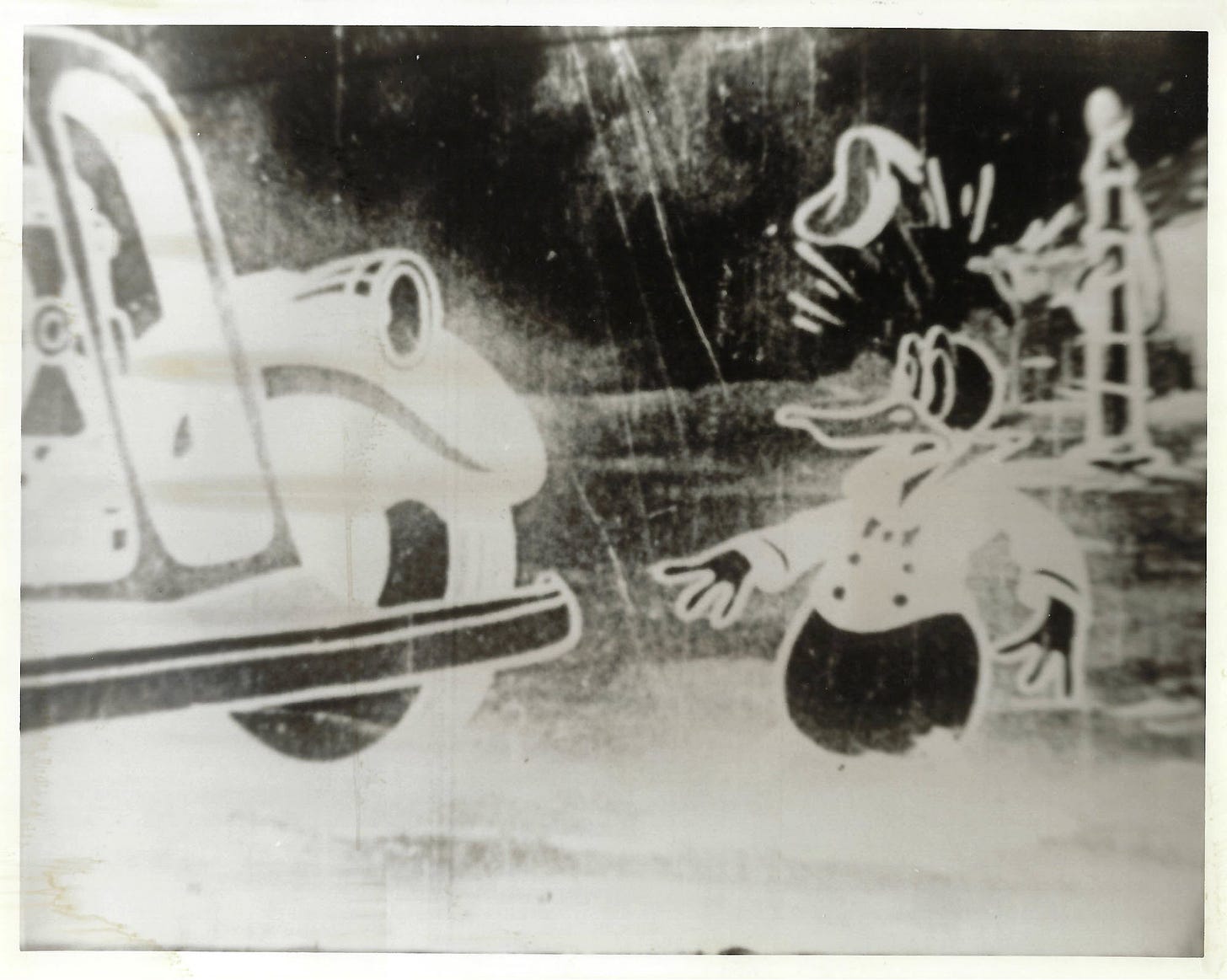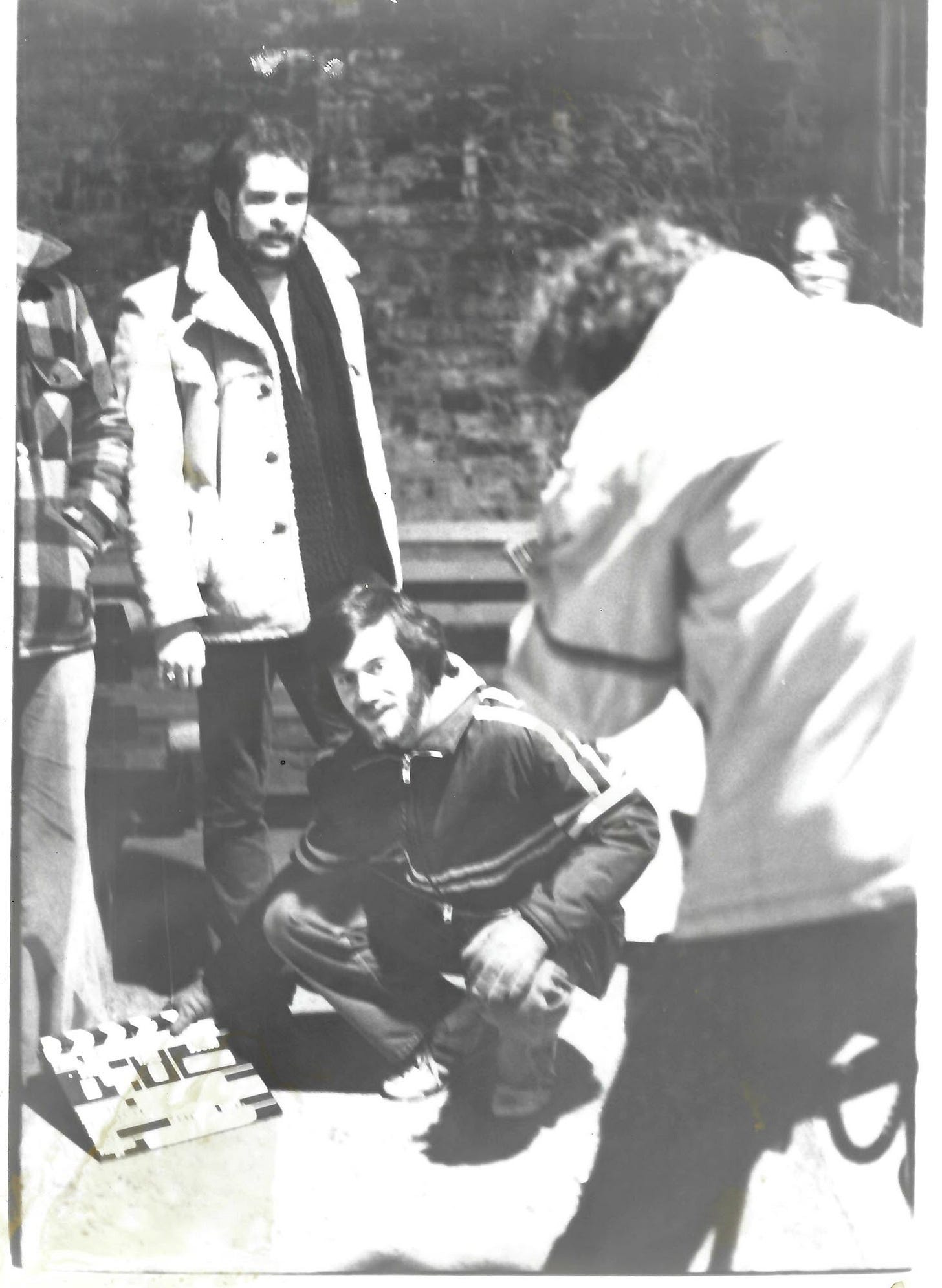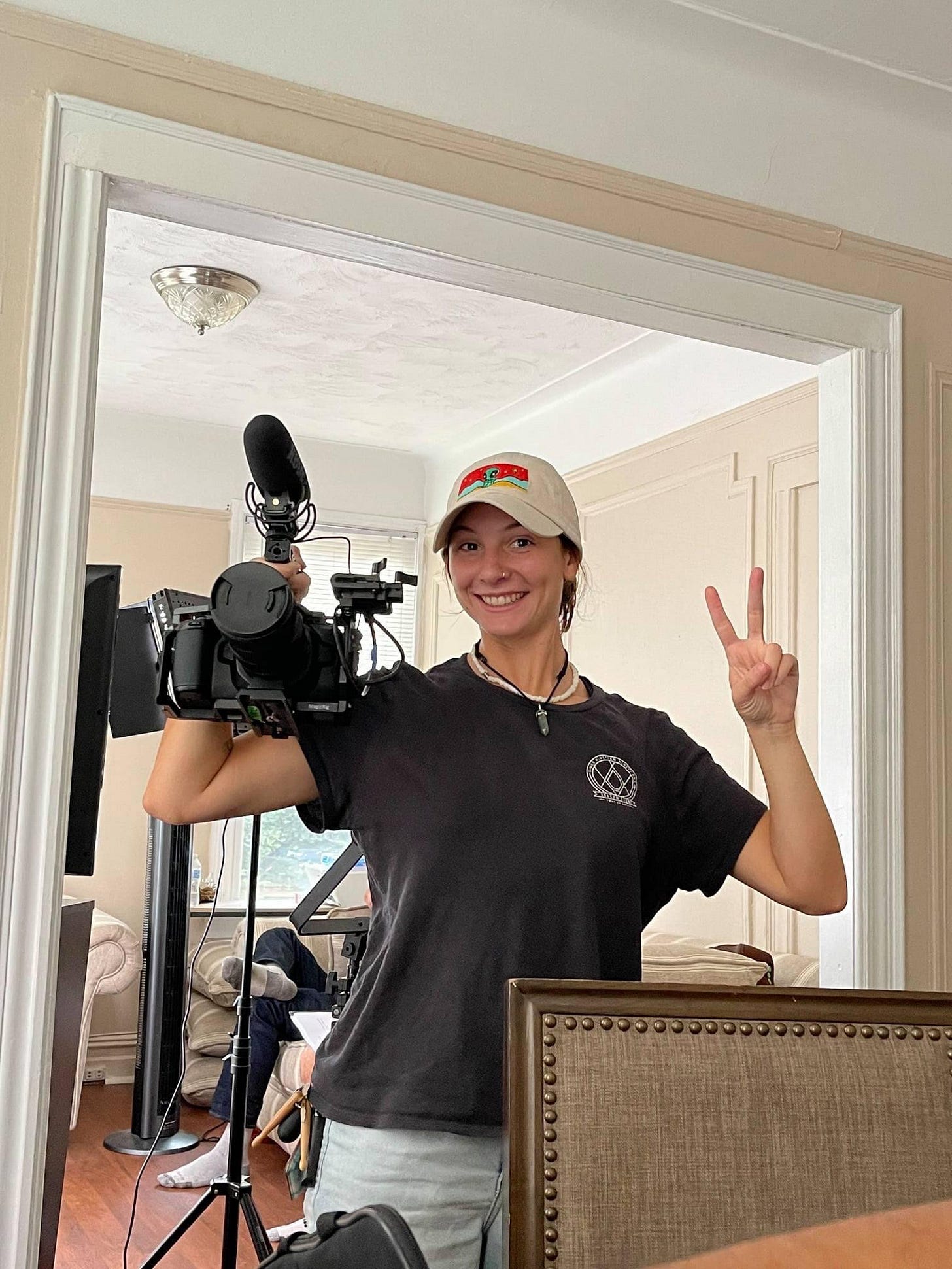From the vault: James Irwin interviewed by Jenna Reilly (2019)
Being an indie filmmaker and media artist near the end of the last century
Periodically I’ll post articles originally published in the past – sometimes the distant past! This piece is an interview of me by the media producer Jenna Reilly in 2019. At the time Jenna was a student in television and digital media at Montclair State University (where I sometimes taught communications as an adjunct, but not when Jenna was there). The focus of the interview is the period in my life when I was an independent filmmaker and media artist, from the mid-1970s up until the early 1990s. I had a good run, being widely exhibited throughout North America and also being shown in South America and Europe. I won a lot of awards, including National Endowment for the Arts, National Endowment for the Humanities, San Francisco Museum of Modern Art, Rockefeller Foundation, Pennsylvania Council for the Arts, American Film Institute, and numerous festivals. You can read what critics have said about some of my work on my website at jrirwin.com.
What inspired you to want to become a filmmaker?
I loved movies when I was a kid. That’s a common thing to say, but I loved them more than most. I loved watching classic films from the past on TV. I had wide tastes, I’d watch anything, but I particularly liked westerns, and adventure films, and mysteries. I also had a soft spot for cheesy horror and sci-fi pictures. I dreamed of the kinds of films I would make, and the stories I would tell. But I had no idea how I would do that as a kid in the suburbs of Philadelphia.
When I was about 13 or so, my local PBS station aired The Seven Samurai which is a great 1954 Japanese epic by Akira Kurosawa. I was a huge fan of westerns and swashbuckling adventure films and The Seven Samurai shared a sweeping, historical view like them, and focused on characters in action like them. But even at 13 I knew that Kurosawa was doing something far, far better than what I was used to seeing. It was more visually beautiful, more emotionally resonant. I had never seen weather used that way, almost like a character, and the use of long focal length lenses fascinated me even though at the time I didn’t realize that was what made the images look that way.
Of course, I didn’t know at the time that The Seven Samurai is considered one of the greatest works of cinema and is immensely influential. I just knew, at that moment, that making films was what I was going to do.
What was the genre of your films?
What I was most known for, the genre that got me the most attention, was a mix of photography and animation that used words on the screen, sometimes scratched in or written on the film emulsion. Back then people would sometimes include me in the 1980s period of text-as-image in art, which included Barbara Kruger, Ed Ruscha, Peter Rose, Jenny Holzer, among other artists. Critics typically thought my films contained a healthy amount of humor, sexual innuendo, and attitude.
I also did work in experimental narrative, and documentary, including a piece on Pennsylvania country auctions that appeared on public television. In addition, I did a few film/performance mashups with music and storytelling.
And I had a couple of screenplays that were in development down in Hollywood, so I had a foot in that world as well. They never got made, but had I kept at it, who knows?
How easy or difficult was it to find the right crew to make your films?
On some short films I did all the creative work myself, so that was easy. On others where I needed crews, generally I lived in or near cities where there was a community of independent media producers and we often worked on each other’s projects, for pay or as a favor. At the time there were a lot of creative, smart people who worked in film because they loved it and they built a support system to enable them to continue working in it, outside of the mainstream.
How did you come up with ideas for these films?
Depends; but really, there’s always ideas. You just do the work, and ideas come, and some turn out better than others. Sometimes you have something you want to say, or a story to tell. Other times you are looking at a pile of old film reels you bought at a flea market and you wonder what you can do with them, and they start telling you what they want to become.
Here’s a selection of works and their origins, as examples.
In Farm I wanted to capture the beauty of rolling Central Pennsylvania farmlands. This film is pastoral in all the right ways. I recorded the music using an organ in a Methodist church in Norristown PA. It all sounds a little corny, perhaps, but it is lovely, and it was part of a group exhibition at the Museum of Modern Art in New York, so there.
In Ku I wanted to tell a handful of ghost stories that happened to me. This is a film/performance. The film part never changed, and it is projected during the entirety of the piece. Originally I did the performance part myself playing piano and telling the stories. A later version features a woman telling the stories as she randomly changes the music stations on a clock radio.
I.D.N.O. is based on a goofy misunderstanding; I created it just to do something other than work on the longer, more difficult film I was supposed to be working on. Even though it was almost a throwaway it went on to get screened everywhere and win honors at multiple festivals and screened at the San Francisco Museum of Modern Art, so you never know.
The Big Red Auk began as a piece of absurdist poetry. Critics are on the record as seeing sexual innuendo there. What can I tell you?
Dead Money was built around some extra footage I had that reminded me of evidence before and after a crime. The original footage was heavily influenced by low-budget film noir and early Jean-Luc Godard.
Hat Boxing was a version of a short play I wrote years earlier, performed like a radio skit on audio, with imagery made up of kids’ toys and illustrations from an old Flash Gordon comic book (it was as loony as it sounds; also funny).
The moral: Ideas are everywhere, littered about the place.
What was the hardest part about putting a film together?
Remember that when I was a working filmmaker it was pre-digital, pre-Internet. There was video but it was clunky and expensive and ugly. Today you can create beautiful films on HD video, on your phone even, cut them with software, and distribute via Vimeo or YouTube or native on social media, all for very little (or even no) money. Back then we had none of that. So money was the hardest part during production, because all the things you can do easily yourself now you needed to pay other people for: renting the equipment, buying the film stock, doing the sound mixing, striking the final prints. Getting people to volunteer their time and their apartments as locations.
Then the REAL hard part came, which was finding your audience. Getting the film in front of the right people, who might like it and tell others. It was so very hard to be distributed, to be seen. There were virtually no channels for independent work outside of festivals and a handful of film showcases and university film groups.
This is why I always explain to people that back in the days of the post-studio independent film scene, it wasn’t the people who were the most talented or had the best ideas who were given the opportunity to create features outside of the system, it was the people who had access to capital (whether through family or friend wealth or being fortunate enough to meet the right person at the right time).
How was it working by yourself?
I went to the Tisch School of the Arts in New York University, which was one of the three best film schools in the country. I left with tremendous knowledge of all aspects of filmmaking, both technical and theoretical. There wasn’t any part of the process I wasn’t trained to do. So as long as I wasn’t required to be in two places at once (e.g., if I was acting I couldn’t do the cinematography), then I was fine doing it all.
However, I really, really like collaboration with a full crew. I love that process, where I have a vision but I also leave room for the creative contributions of others, and together we create something that is much more interesting and nuanced than I could ever do myself.
How did you feel when you won those awards for the films you made?
It feels great to get any kind of positive feedback on something you create. It validates the effort, obviously, by suggesting that what you do is “good.” But it also means other people besides you understand what you are doing, what you are trying to achieve. It means other people “get it.”
When you make a film you think is funny, even if it is strange and a little disturbing and not quite like anything else, and then the Los Angeles Times film critic writes a review and he says your film is funny, you are pleased, but also relieved: Hey, you think, I’m not alone. And when the San Francisco Museum of Art gives you an honor over competition that included filmmakers a lot more famous than you are, it is a little startling, you struggle with a bit of impostor syndrome, and then you think, I’ve got something to offer.
What was your most prized film?
Prized by me or by others? For others, probably the film I.D.N.O. which won all the awards and was shown all over the place. People just loved it even though they never find out what I.D.N.O. stands for (and I never will tell them – it’s a sealed box).
For me it was an hour-long experimental narrative called The Role of the Observer about a writer trying to finish a book but who was sliding between dream and memory. It had a bit of everything in it, with a structure where I could do – and did – anything I wanted. There are sequences in there that are the best things I’ve ever done. There’s original music. There’s footage from a cat’s POV. Footage that I shot from a plane over San Francisco (a friend and I rented the plane, he flew it) intercut with a WWII bombing of a European city. There’s tennis. There’s bits and pieces of films past. There’s cartoons. In the end it was like a snapshot from the inside of my brain at that time, totally biographical but in a way that was mostly – but not completely – disguised.
Why did you stop filmmaking?
I had finished a tour of my films at galleries, colleges, and theatres around the country, so that was a milestone, and other things were starting to really kick into high gear. I had written a novel, and my agent was close to doing a deal with a New York publisher. I was developing an art exhibition for a museum in Hawaii. And the company I owned was hired to run a senatorial campaign. So I didn’t have time to do films.
Then, essentially overnight, my life in San Francisco was destroyed, and I left to come back to the East Coast. (It’s a long story.) I wasn’t the same. I lost all interest in filmmaking (I lost all interest in life, actually). I was even hired as a tenure-track professor of communications at a university in New Jersey to teach film production and history, where there was the time and expectation I would do my own film work, but in truth I didn’t have the desire any longer. It was all over.
Do you miss filmmaking?
Interesting question. I don’t have the energy or the desire to start fresh. I wouldn’t want to be scrambling to put a production together like the old days. I couldn’t do what my cousin is doing down in Philadelphia, producing and acting in low-budget indies and television series, doing really good work, hoping to be picked up by distributors, looking to get a bigger budget for the next one. That version of the creative battle doesn’t interest me any longer. Instead, I’ve turned to writing.
What I do miss, on the other hand, is being the kind of filmmaker I would have been had I continued in the original direction. I miss the road I never got a chance to take, because of what happened to me when I was 35. I would have no doubt gone on to do some really interesting things. I would have enjoyed working in digital HD video, and distributing over the internet. I would have known how to leverage social media to get word out about my films. I would love to direct with a real crew again, backed by real money. These things will never happen. And that’s okay, because I’m directing my creativity elsewhere. But yes, there are times I wonder what might have been.







